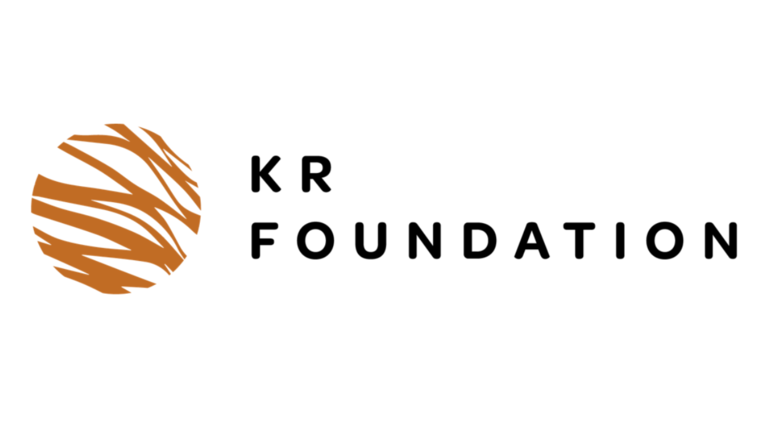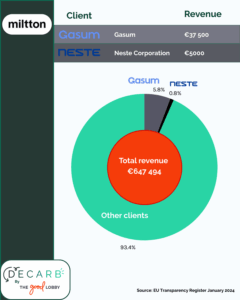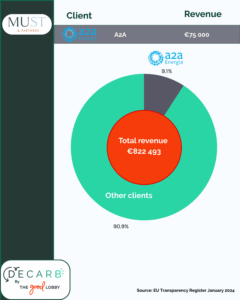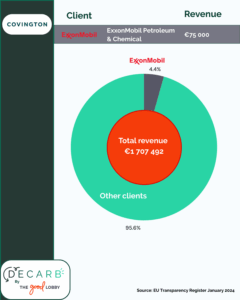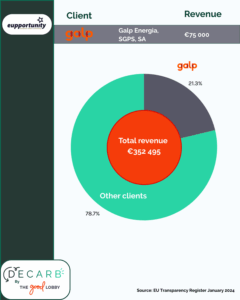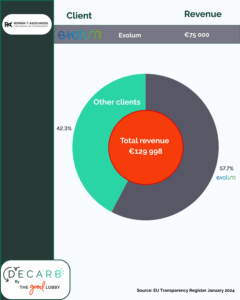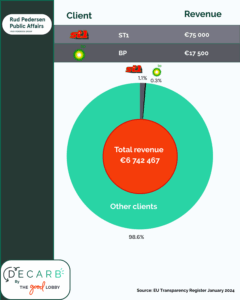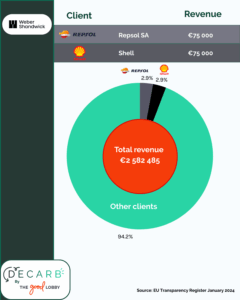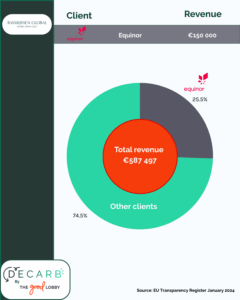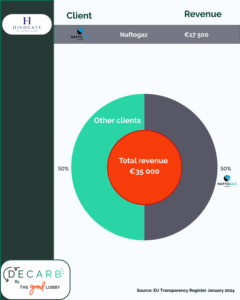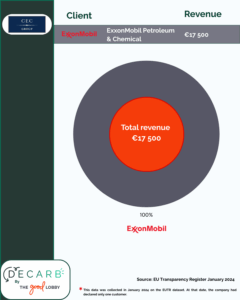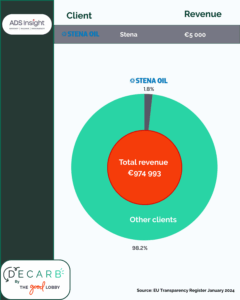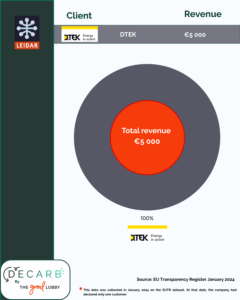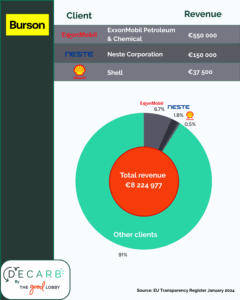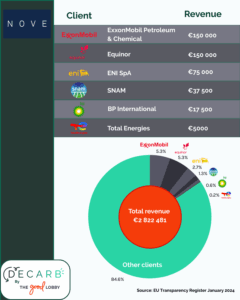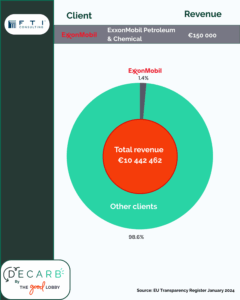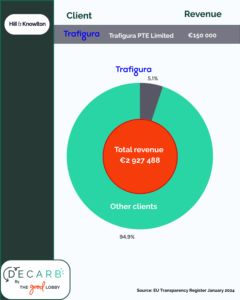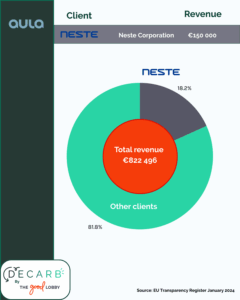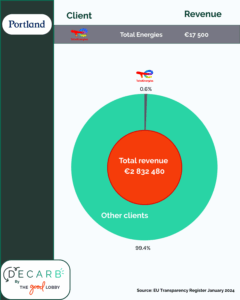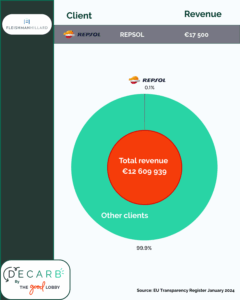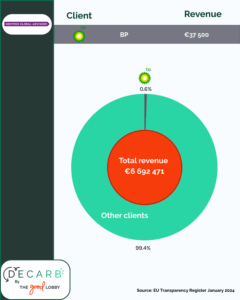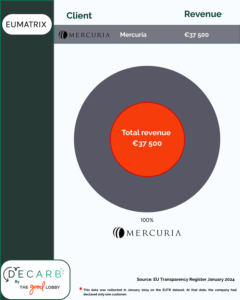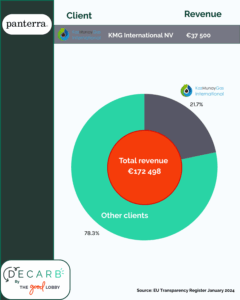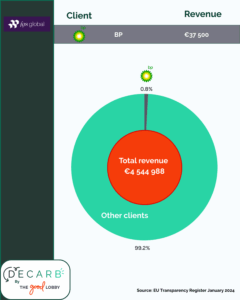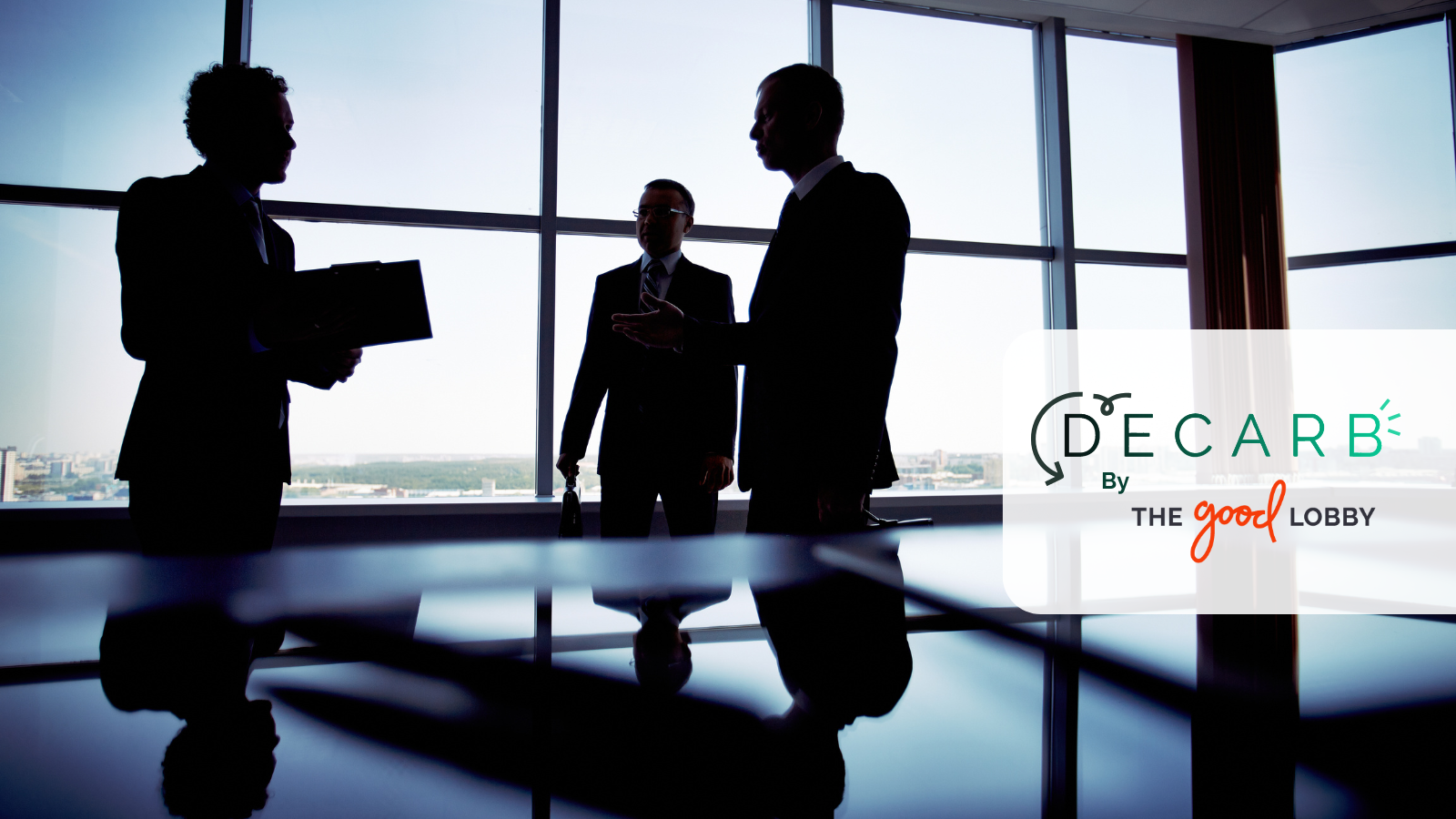
The Decarb Initiative: Decarbonising Professional Influence provides the first data set of and ranking of public affairs and law firms based on the volume of work they do for the fossil fuel industry. More broadly, it investigates lobbying ties between fossil fuel companies and EU-based consultants, by seeking to uncover:
How much these firms provide lobbying services to the fossil fuel industry
Whether these services conflict with the firms’ sustainability commitments
The extent of the revenue dependency of the firms on this industry.
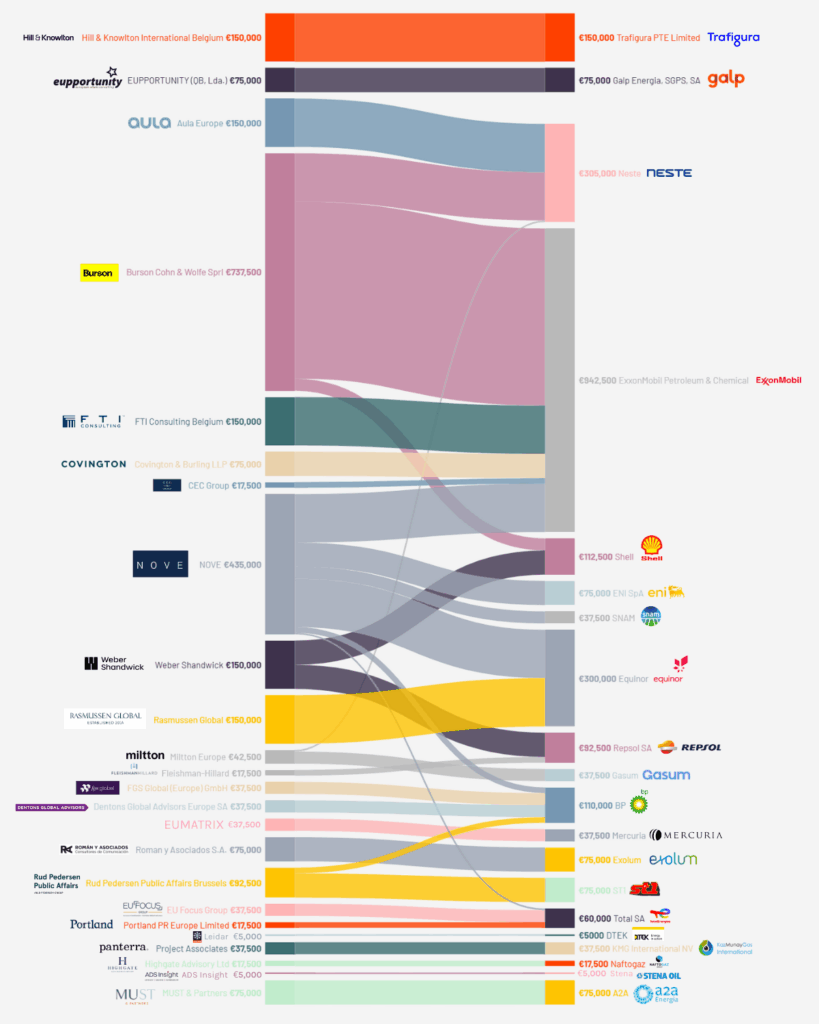
*Data refers to the most recently closed financial year in the EU Transparency Register
interactive visualisationCore Findings
Four of the top ten public affairs and law firms lobby on behalf of fossil fuel clients
Many of the most hired firms work simultaneously for companies that tend to oppose pro-climate policies
Many of these firms make public and pronounced sustainability commitments that stand in stark contrast to their work for anti-climate clients.

Call to Action
Our preliminary findings suggest that, while the lobbying activities of public affairs and law firms go largely under the radar of public scrutiny many of these firms do indeed act on behalf of fossil fuel companies and are relevant enablers of climate inaction. However, by and large, their revenues are not so dependent on fossil fuel clients that these accounts are essential to their existence: most lobby and law firms could easily drop their climate policy obstructing work at negligible impact on their bottom line and reap a dramatically reduced reputational risk. For the few firms whose income streams are significantly reliant on fossil fuel, it is time for them to diversify their client portfolios.
Rankings
We also looked at total revenues derived from the consultancies from fossil fuel firms for the top 25 consultancies, as displayed in this graph.
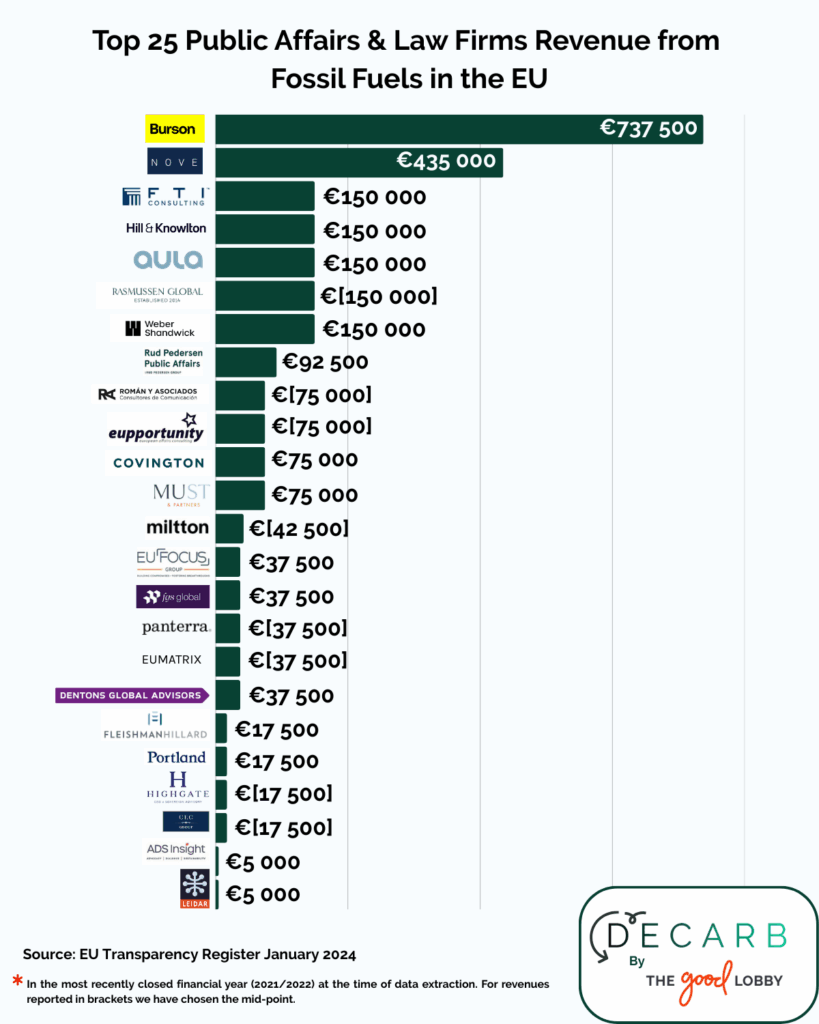
Below this is the fossil fuel companies’ annual expenditure on lobbying in the EU.
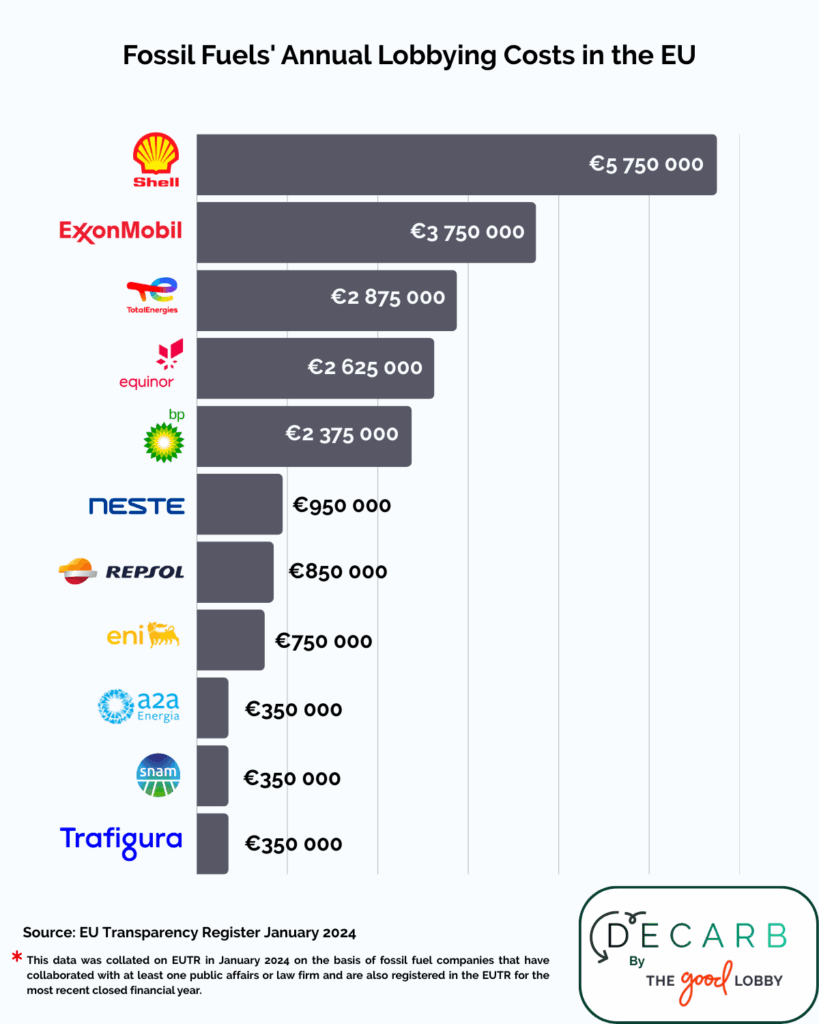
It highlights the extent to which lobbying is done in-house as compared to intermediaries such as consultancies. In that regard, by comparing this data with the diagram above on consultancy expenditures, several observations can be made. Firstly, in many instances, we can see that total lobbying spending far exceeds that directed to lobbying consultants (e.g. Shell or ExxonMobil). With others, their declared lobbying is explicitly done by consultancies (e.g. Gasum) or is only done by in-house lobbyists (e.g. Snam). Moreover, some fossil fuel firms rely on multiple consultancies (e.g. BP or ExxonMobil), whereas others engage a single entity (e.g. Trafigura).
Scorecards
Here you can find the individual scorecards for the relevant consultancies and law firms examined. These identify the exact fossil fuel clients they have served in terms of lobbying services, the amount of revenue received from each, and the proportion of revenue received from each fossil fuel client as compared to total revenues.
Theory of Change
Decarbonising lobbying in this context means to encourage public affairs and law firms to apply their lobbying skills in a responsible manner, aligned with planetary boundaries, in what clients and what briefs they take on and how they exercise their influence.
Decarb proceeds in three steps:
Disclose how much lobbying spending is diverted by fossil fuel firms to public affairs and law firms (who is lobbying for which fossil fuel company) and how reliant these firms are on their fossil fuel clients (how dependent are they on such clients in terms of their underlying business model). By identifying the most fossil fuel-entrenched firms, we aim to illuminate the structural dynamics that perpetuate fossil fuel lobbying.
Identify potential levers for change in the broader ecosystem and brainstorm specific action options: is there a role for consumers, employees or shareholders? How can incentives be rewired to encourage these professionals to cut ties with fossil fuel clients? Which types of alliances and paths for change are most promising? This phase also examines promising alliances and strategies that could catalyse change across the sector.
Explore ways to support internal agents of change: Are there any emerging professional norms and good practices that can serve as reference points for employees to work inside their companies towards decarbonisation? How can these potential change agents be networked and equipped with potent advocacy strategies to work internally towards more responsible conduct?
Methodology
Decarb relies on a multifaceted methodology that combines:

Primary data analysis of a number of key lobby registers

Stakeholder engagement involving key informant interviews with a diverse range of stakeholders in the broader public affairs ecosystem

A scan of the existing empirical literature to further contextualise findings and identify gaps in the current understanding of public affairs and law firms’ role in fossil fuel lobbying

A set of networking events with public affairs professionals and other stakeholders, fostering dialogue and collaboration around decarbonisation goals
Get Involved
Collaborate
Contact us and come along to our workshops and events to share your input.
Stay Informed
Register for our project updates to receive the latest research developments and event announcements.
Advocate
Help amplify our mission by sharing information about Decarb with your networks.
Project funded by
